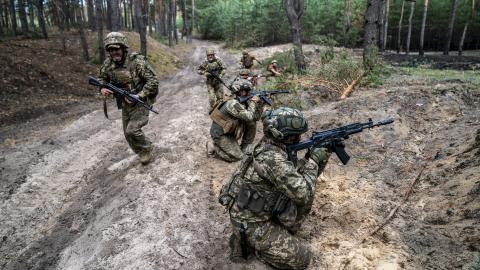Since Russia’s aggression in Ukraine started in February 2022, international politics have changed. The ongoing war continues to bring change and upheaval to the world order. Thus, it is logical that we should ask what kind of world will develop if the war continues. This blog analyzes the topic through three questions: What outcome can we expect in this war? What impact has this war had on the world already? And what will happen if the war drags on?
There is No Incentive to End This War
What outcome can we expect in this war? To end the war, both Russia and Ukraine need a legitimate goal. The Russian side needs victory. Since Russia has already spent too much of its capital and resources on this war, it needs to legitimize this war as a victory, as it could by occupying a big Ukrainian city like Kyiv, Kharkiv, or Odessa. Without such a clear achievement, the Russian people would likely doubt the skill of President Putin and his regime.
Ukraine also needs a victory. For Ukraine, the definition of victory is successfully defending its territory. Ukraine cannot afford to have Russia occupy the territory it has taken since 2014, which includes Crimea and Eastern Ukraine. Ukraine also needs a system to ensure its safety after the war. There is a strong possibility that a ceasefire would allow Russia to reconstruct its invading forces. Thus, a temporary ceasefire might just lead to another war in the near future. In addition, NATO cannot accept a Russian victory, which would prove that the war was useful for achieving Putin’s political goals. This might lead Russia to invade the wider area, including the Baltic states, Poland, Finland, Moldova, etc. In addition, if Russia wins the war, other countries such as China would be emboldened. Given this situation, it is impossible to expect that the war will end soon.
Impact on the World Order
So if the war continues, what will happen? To answer this, we should evaluate the impact the war has already had. The ongoing war has changed the world in at least three areas.
First, this war delineated two groups: the West and the anti-West. Since Russia’s aggression in Ukraine started, many countries—including 31 NATO countries, Japan, South Korea, Taiwan, Singapore, Morocco, etc.—criticized Russia’s actions, joined sanctions against Russia, and provided weapons or humanitarian assistance to Ukraine. On the anti-West side, Iran and North Korea are providing weapons to Russia. And China has been expanding its defense and trade cooperation with Russia. The U.S. is now starting to blame China for supporting Russia’s military industry and has imposed sanctions on Chinese companies. Countries in both groups have felt that they have been on the same side for more than two years, and they have expanded their internal cooperation. Thus, the war is bonding them into a bigger group of nations.
The second impact has been increased defense spending. According to the Stockholm International Peace Research Institute (SIPRI), a think tank in Sweden, world military expenditures increased 3.7 percent in 2022 and 6.8 percent in 2023 compared with the previous year. SIPRI also pointed out that “world military spending per person was the highest since 1990, at $306.” This is important because higher defense spending increases the influence of the defense industry on political decision-making. Indeed, this trend is just the beginning, and it will escalate if the war continues. In the case of Britain in World War II, Prime Minister Winston Churchill pointed out interesting facts based on his experience. In his book, World War II, he said there was a four-year process for expanding defense production. During the first year of war, factories did not produce anything. During the second year, factories produced a little. During the third year, they produced a lot of weapons. And during the fourth year, they produced a flood. If this example applies to Ukraine, then it is at the cusp of significantly expanding defense production. This also means that the political power of the defense industry in many countries will only expand.
Third, the war has created a new trend toward “economic security.” Russia’s aggression in Ukraine proved that Western countries need to decouple from Russia. It has revealed the risk of overdependence on a single supplier, and the impact that could have on critical resources and technologies. Such a mindset will change the world’s economic principles. After the Cold War, global free trade was the dominant maxim. If quality and cost were superior, the political side was not a matter of concern. As a result, many countries relocated their factories to China. However, if China invades Taiwan, there is a strong possibility that many countries will be forced to decouple from China. Russia’s aggression in Ukraine proved such a risk. As a result, the recent trade trend has been “friend shoring.” Countries have tried to reconstruct their supply chains with friendly nations. This “blocked” economy is an alternative to global free trade. “Economic security” means that security is paramount in trade decisions, and that the trading partner’s reliability is an important factor in the equation.
Advantages of the US Side
What will happen if the war drags on? As described above, the tendencies toward grouping, the expanding influence of defense industries, and a new emphasis on economic security will continue and escalate. Each country will be asked which side it is on.
In the Indo-Pacific, whether one is on the U.S. or China side is an important matter—and the U.S. has an advantage. The U.S. has 53 treaty-based allies, including NATO, Central and South American, and Indo-Pacific allies, including Japan, Taiwan, South Korea, the Philippines, Thailand, and Australia. China has only one treaty-based ally, which is North Korea. If the war continues, it is expected that these 53 countries will form a strongly bonded group in the near future. The West has a huge advantage in this case.
Read the full article in the Institute for Security and Development Policy.

















